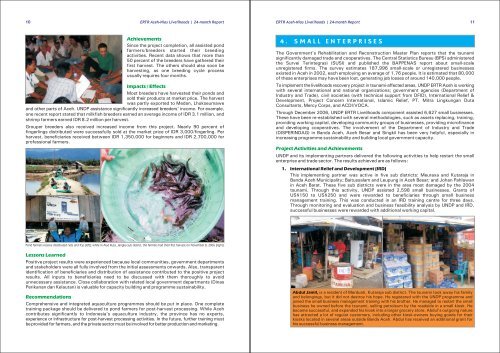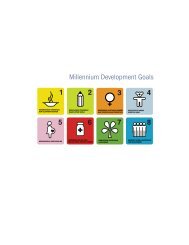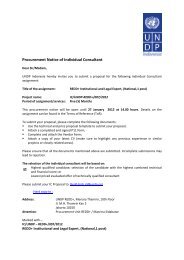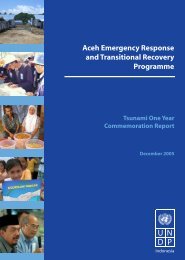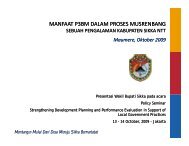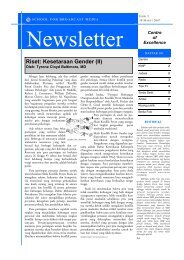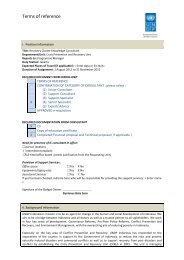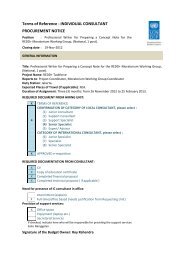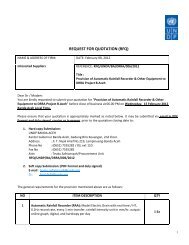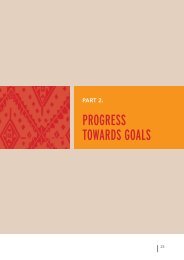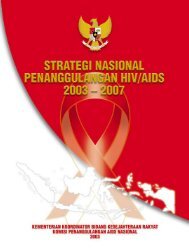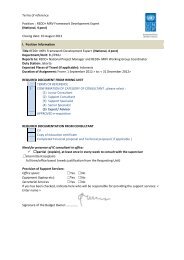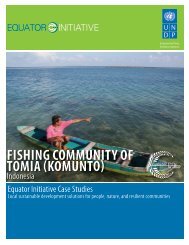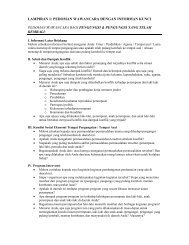(ERTR) Livelihoods Programme - UNDP
(ERTR) Livelihoods Programme - UNDP
(ERTR) Livelihoods Programme - UNDP
You also want an ePaper? Increase the reach of your titles
YUMPU automatically turns print PDFs into web optimized ePapers that Google loves.
10<br />
<strong>ERTR</strong> Aceh-Nias <strong>Livelihoods</strong> | 24-month Report<br />
<strong>ERTR</strong> Aceh-Nias <strong>Livelihoods</strong> | 24-month Report<br />
11<br />
Achievements<br />
Since the project completion, all assisted pond<br />
farmers/breeders started their breeding<br />
activities. Recent data shows that more than<br />
50 percent of the breeders have gathered their<br />
first harvest. The others should also soon be<br />
harvesting, as one breeding cycle process<br />
usually requires four months.<br />
Impacts / Effects<br />
Most breeders have harvested their ponds and<br />
sold their products at market price. The harvest<br />
was partly exported to Medan, Lhokseumawe<br />
and other parts of Aceh. <strong>UNDP</strong> assistance significantly increased breeders' income. For example,<br />
one recent report stated that milkfish breeders earned an average income of IDR 3.1 million, and<br />
shrimp farmers earned IDR 8.2 million per harvest.<br />
Grouper breeders also received increased income from this project. Nearly 90 percent of<br />
fingerlings distributed were successfully sold at the market price of IDR 3,000/fingerling. Per<br />
harvest, beneficiaries received between IDR 1,350,000 for beginners and IDR 2,700,000 for<br />
professional farmers.<br />
4 . S M A L L E N T E R P R I S E S<br />
The Government's Rehabilitation and Reconstruction Master Plan reports that the tsunami<br />
significantly damaged trade and cooperatives. The Central Statistics Bureau (BPS) administered<br />
the Survei Terintegrasi (SUSI) and published the BAPPENAS report about small-scale<br />
unregistered firms. The survey estimates 187,996 small-scale or unregistered businesses<br />
existed in Aceh in 2002, each employing an average of 1.76 people. It is estimated that 80,000<br />
of these enterprises may have been lost, generating job losses of around 140,000 people.<br />
To implement the livelihoods recovery project in tsunami-affected areas, <strong>UNDP</strong> <strong>ERTR</strong> Aceh is working<br />
with several international and national organizations; government agencies (Department of<br />
Industry and Trade), civil societies (with technical support from DFID), International Relief &<br />
Development, Project Concern International, Islamic Relief, PT. Mitra Lingkungan Duta<br />
Consultants, Mercy Corps, and ACDI/VOCA.<br />
Through December 2006, <strong>UNDP</strong> <strong>ERTR</strong> <strong>Livelihoods</strong> component assisted 6,627 small businesses.<br />
These have been re-established with several methodologies, such as assets replacing, training,<br />
providing working capital, developing community groups of businesses, providing microfinance<br />
and developing cooperatives. The involvement of the Department of Industry and Trade<br />
(DISPERINDAG) in Banda Aceh, Aceh Besar and Singkil has been very helpful, especially in<br />
increasing programme sustainability and building local government capacity.<br />
Project Activities and Achievements<br />
<strong>UNDP</strong> and its implementing partners delivered the following activities to help restart the small<br />
enterprise and trade sector. The results achieved are as follows:<br />
1. International Relief and Development (IRD)<br />
This implementing partner was active in five sub districts: Meuraxa and Kutaraja in<br />
Banda Aceh Municipality; Baitussalam and Leupung in Aceh Besar; and Johan Pahlawan<br />
in Aceh Barat. These five sub districts were in the area most damaged by the 2004<br />
tsunami. Through this activity, <strong>UNDP</strong> assisted 2,598 small businesses. Grants of<br />
US$150 to US$250 and were rewarded to beneficiaries through small business<br />
management training. This was conducted in an IRD training centre for three days.<br />
Through monitoring and evaluation and business feasibility analysis by <strong>UNDP</strong> and IRD,<br />
successful businesses were rewarded with additional working capital.<br />
Pond farmers receive distributed nets and frys [left]; while in Alue Kuta, Jangka sub district, the farmers had their first harvest on November 8, 2006 [right].<br />
Lessons Learned<br />
Positive project results were experienced because local communities, government departments<br />
and stakeholders were all fully involved from the initial assessments onwards. Also, transparent<br />
identification of beneficiaries and distribution of assistance contributed to the positive project<br />
results. All inputs to beneficiaries need to be discussed with them thoroughly to avoid<br />
unnecessary assistance. Close collaboration with related local government departments (Dinas<br />
Perikanan dan Kelautan) is valuable for capacity building and programme sustainability.<br />
Recommendations<br />
Comprehensive and integrated aquaculture programmes should be put in place. One complete<br />
training package should be delivered to pond farmers for post-harvest processing. While Aceh<br />
contributes significantly to Indonesia's aquaculture industry, the province has no experts,<br />
experience or infrastructure for post-harvest processing activities. In the future, further training must<br />
be provided for farmers, and the private sector must be involved for better production and marketing.<br />
Abdul Jamil, is a resident of Merduati, Kutaraja sub district. The tsunami took away his family<br />
and belongings, but it did not destroy his hope. He registered with the <strong>UNDP</strong> programme and<br />
joined the small business management training with his brother. He managed to restart the small<br />
business he owned before the tsunami, selling petroleum by the roadside in a small kiosk. He<br />
became successful, and expanded his kiosk into a larger grocery store. Abdul's outgoing nature<br />
has attracted a lot of regular customers, including other kiosk-owners buying goods for their<br />
kiosks located in several areas outside Banda Aceh. Abdul has received an additional grant for<br />
his successful business management.


